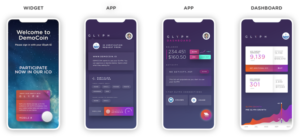Glyph is an identity platform with a working product that performs KYC and accredited investor checks (among other things) in seconds. We then allow users to both use that repeatedly with zero friction and an incredible experience and re-KYC with our partners on every login with no extra work.
Glyph does this in an interesting way – we break personalities (identity) into particles (data) and then give companies the ability to ask a user for specific particles that answer specific questions, not just one but at every login/authentication touch. We are not a “KYC company”.
Instead, we’re a “self” company that can prove to anyone that someone is who they say they are by sending the appropriate “particles” (or attributes) instantly when you that person for them.
Our model removes the need to “re-KYC” every time someone needs to know who I am. If I’m not a Glyph user, it takes about 30 seconds. If I am a Glyph user – it takes about 2 seconds.
Coming into the platform gives partners the ability to access data from any partner who is part of the platform – but through the vehicle of the person. The person is the platform.
Glyph enables you to take control of your personal data. We do this by providing you open tools to capture your information from official sources such as your drivers license, or from technology and services you interact with, such as location services on your phone. Glyph chunks that information down into shareable items which we call particles. Your entire identity is made up of these particles, i.e. your name, your date of birth etc. Glyph gives you tools to be able to share those.
Glyph is the interface. Our aim is to help you share the data that is already available. In version one, we help you store the information, heavily encrypted, in a secure location. Soon, you will be able to choose where you store that information: whether it’s on a blockchain service, your own device, or a home server like Daplie. Because it’s yours, you control where its stored.
Glyph then provides you the tools, such as through the app or via our open APIs, to be able to share it with others in a way that is secure, transparent, and completely trackable.
You record your information by scanning it from official documents, or by pulling it from other sources, such as your social media, your phone, or wearables. When you are asked to share this information, you can choose to share it or not. You have complete control.






Medium by @IAmJamesGreaves